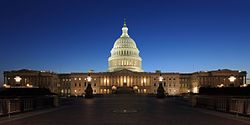| 113th United States Congress | |
|---|---|
112th ← → 114th | |
 United States Capitol (2013) | |
January 3, 2013 – January 3, 2015 | |
| Members | 100 senators 435 representatives 6 non-voting delegates |
| Senate majority | Democratic |
| Senate President | Joe Biden (D) |
| House majority | Republican |
| House Speaker | John Boehner (R) |
| Sessions | |
| 1st: January 3, 2013 – December 26, 2013 2nd: January 3, 2014 – December 16, 2014 | |

The 113th United States Congress was a meeting of the legislative branch of the United States federal government, from January 3, 2013, to January 3, 2015, during the fifth and sixth years of Barack Obama's presidency. It was composed of the United States Senate and the United States House of Representatives based on the results of the 2012 Senate elections and the 2012 House elections. The seats in the House were apportioned based on the 2010 United States census. It first met in Washington, D.C., on January 3, 2013, and it ended on January 3, 2015. Senators elected to regular terms in 2008 were in the last two years of those terms during this Congress.
Contents
- Major events
- Major legislation
- Enacted
- Proposed
- Appropriations bills
- Party summary
- Senate
- House of Representatives
- Leadership
- Senate 2
- House of Representatives 2
- Members
- Senate 3
- House of Representatives 3
- Changes in membership
- Senate 4
- House of Representatives 4
- Committees
- Senate 5
- House of Representatives 5
- Joint committees
- Caucuses
- Employees
- Legislative branch agency directors
- Senate 6
- House of Representatives 6
- See also
- Elections
- Membership lists
- Notes
- References
- External links
The Senate had a Democratic majority, while the House had a Republican majority; such a split would not be repeated until the 118th Congress. This was the last time Democrats held control of the Senate until the 117th Congress in 2021.

















